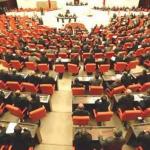CONSTITUTIONAL REFORM PACKAGE
Political Party Closure Article Dropped

The constitutional amendment that should have made it more difficult to dissolve a political party did not pass through parliament.
In yesterday's (3 May) second round of voting, 327 deputies voted in favour of the clause and 76 against. Thus, the voting remained below the threshold of 330 votes to pass through parliament.
Considering the fact that the President of Parliament, Mehmet Ali Şahin, cannot participate in the voting, the ruling Justice and Development Party (AKP) had a total of 335 votes. This means that eight AKP MPs did not back the proposal.
In the first round of voting on 21 April, the clause was accepted with 337 votes. Five of these votes came from the pro-Kurdish Peace and Democracy Party (BDP).
Erdoğan: We will continue our way
Prime Minister Recep Tayyip Erdoğan initially refused to answer the journalists' questions after the voting. Later on he announced that "the deputies rightfully used their power. We are determined to continue our way; we will carry on with the voting for the package".
Article 69
Article 69 on "Principles Observed by Political Parties" regulates that the financial auditing of political parties shall be carried out by the Constitutional Court. The amendment suggested to transfer the auditing to the Court of Auditors from 2010 onwards.
Furthermore, the article stipulates that the dissolution of political parties shall be decided finally by the Constitutional Court after the filing of a suit by the office of the Chief Public Prosecutor of the Republic. The amendment proposed to establish a commission consisting of five members of each party represented in the Turkish Grand National Assembly. This commission was to approve the law suit by a secret majority vote of two thirds. The commission was to be headed by the President of the Turkish Grand National Assembly (TBMM) who was not entitled to vote.
The decisions of the commission should be independent of the judiciary. The commission was to be established within 30 days of the request for permission to dissolve a party and the decision of the commission should be issued within 60 days after the request of permission had been submitted to the Parliament. Groups of political parties in the parliament were not entitled to discuss the permission request or to decide on it.
In this context, the Constitutional Court may decide for a partial or full deprivation from of subsidies according to the severity of actions as subject of the case instead of dissolving the party. The deprivation from subsidies shall be subject to the closure case and the decision and does not constitute a case on its own.
The members of the closed party who caused the reasons for the closure with their statements and activities should have been imposed to a political ban of three years. This meant a reduction of the five-year political ban by two years.
The wording "dissolve a political party permanently" was going to omit the term "permanently". (TK/VK)
KURDISH QUESTION
PKK Ceasefire to be Terminated on 31 October?

KCK CASE
Court Dismissed Request for Defence in Kurdish

7th Istanbul Gathering for Freedom of Thought

CONSTITUTIONAL AMENDMENTS
58 Percent Said "Yes" to Constitutional Reform Package

Rights Organizations 3 Years ahead of Foreign Minister











